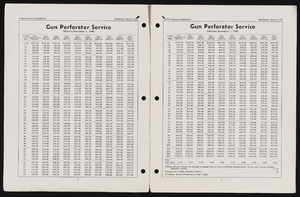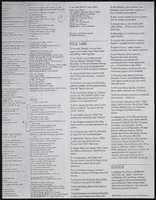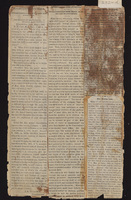Search the Special Collections and Archives Portal
Search Results
Gue Gim Wah Papers
Identifier
Abstract
The Gue Gim Wah Papers (approximately 1940-1985) consist primarily of incoming correspondence (largely written in Chinese) to Gue Gim Wah at the Prince Mine in Pioche, Nevada. Also included are Wah's naturalization certificate, a map of the Prince Mine Bunkhouse, brochure of the Lincoln County Civic Association, and a small amount of photographs including a black-and-white photograph of Gue Gim circa 1940s.
Archival Collection
George Kelly Ryan Papers
Identifier
Abstract
The George Kelly Ryan papers (1921-1971) contain correspondence inquiring about Octavius Decatur "O. D." Gass, newspaper clippings from 1929, handwritten recollections of the Gold Ranch by Laura Royce, and a San Pedro, Los Angeles and Salt Lake Railroad Company information, including information on wash-outs in Nevada.
Archival Collection

Transcript of interview with Carl Ciliax by Gary Wood, March 8, 1980
Date
Archival Collection
Description
On March 8, 1980, Gary Wood interviewed Carl Ciliax (born 1941 in Las Vegas, Nevada) about his experiences living in Nevada. Ciliax first describes his family history, his early interests in wildlife, and his background and education in artwork. Ciliax then discusses his early experiences in hunting and his eventual interest in conservationism and preservation, including his involvement with organizations that sought the protection of desert bighorn sheep and the protection of wildlife in general. The two talk more about wildlife, the early development of Las Vegas, and the effects of the atomic testing. The interview concludes with Ciliax’s recollection of recreational activities and some of his thoughts on conservationism.
Text

University of Nevada, Las Vegas (UNLV) 42nd commencement, Nevada State College 4th commencement program
Date
Archival Collection
Description
Commencement program from University of Nevada, Las Vegas Commencement Programs and Graduation Lists (UA-00115).
Text

Hernando Amaya oral history interview: transcript
Date
Archival Collection
Description
Oral history interview with Hernando Amaya conducted by Laurents Banuelos-Benitez, Marcela Rodriguez-Campo, and Barbara Tabach on October 18, 2018 and December 3, 2018 for the Latinx Voices of Southern Nevada Oral History Project. In this interview, Hernando Amaya talks about his childhood and education in Bogota, Colombia. He discusses his start in journalism as a young man and working for El Espectador, the Colombian national newspaper. He discusses his experiences reporting on the narco-terrorism occurring in Medellin, Colombia and how this eventually led to his immigration to the United States. Amaya moved to Las Vegas, Nevada in 2001 and continued his career in journalism by working for local Spanish speaking papers and websites. He relates his civic involvement in the Las Vegas area, his work as the president of the Colombian Association of Las Vegas, and various other civic engagements. As a journalist, he asserts the importance of knowing one's culture, storytelling, learning history, and being active in the community.
Text

Interview with Nick C. Aquilina, April 6, 2004
Date
Archival Collection
Description
Text

Interview with Erik Thompson, March 4, 2006
Date
Archival Collection
Description
Text



